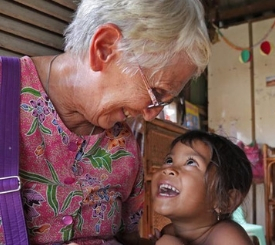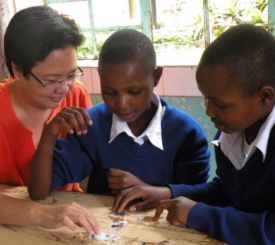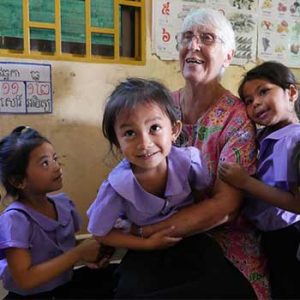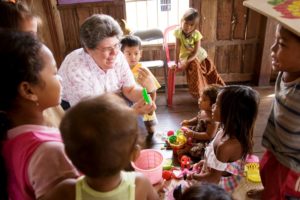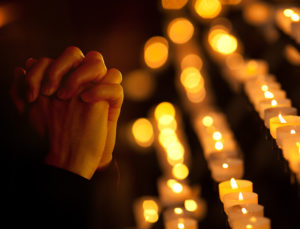What is the connection between poverty and education?
Education is the most powerful weapon in which you can use to change the world. In fact, according to the British Journal of Economics, Management & Trade there is a 0.62 correlation between education and poverty reduction. .
Furthermore, studies from the World Bank show that being able to read and understand a simple text by age ten provides the foundational literacy skills for participation in the workforce and ultimately leading a healthy, prosperous life.
Yet, 124 million school aged children worldwide are not in school due to poverty, hunger, or sickness. For over 100 years, the Maryknoll Sisters have been providing education to those in need throughout the world.
Maryknoll Sisters Work to Educate Children Throughout the World Including:
Cambodia
Sister Mary Little, M.M. runs a preschool in Chake Angre for the most vulnerable of poor children .
Tanzania
Sister Jareen Aquino, M.M. is a mentor at Emusoi Centre, which provides basic education to Maasai girls, who are usually married off at a young age.
Make A Difference
Sister Story: Sister Jareen Aquino, M.M. & Sister Mary Vertucci
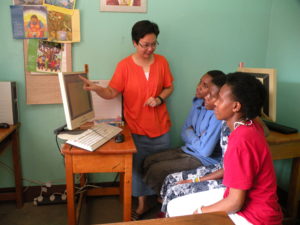
In many communities in the East African nation of Tanzania, education for girls is neglected, and often actively discouraged, beyond that needed for the role of wife and mother.
Sister Jareen Aquino, M.M., and Sister Mary Vertucci have spent the last five years as mentors to girls at the Emusoi Centre in Arusha, Tanzania. The Centre provides a basic education, which then makes it possible for the girls to enroll in high school and get on the road to learning, which will provide them with opportunities for better lives.
“When they left their villages,” Sister Jareen says, “these girls went against what is expected of them: to remain uneducated, marry at a young age, and have children. When they join Emusoi, they are aware that they will be going to secondary school, but what they don’t know are the things that will be revealed in their lives as they discover their worth and potential as individuals. There is uncertainty and pressure, but these young women are determined to see what is before them for a better future for themselves and their families.”
One of the girls Sister Jareen worked with, Neema Musa, has gone on to university—something that until recently was almost unheard of among girls from the pastoralist and hunter-gatherer tribes in Tanzania. Sister Jareen guided Neema through the complicated application process for her scholarship.
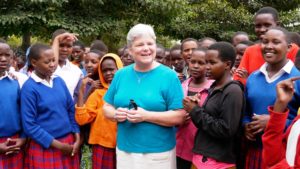
“I still remember the different questions that she had to answer,” Sister Jareen recalls, “and one of them was what symbol best describes you? This question caught her off guard, because they seldom experience questions that let them reflect on life (since the educational system is all about academics).
“It took her quite some time to answer this, but I was so happy that it really made her reflect on things. She came up with an answer. Her symbol was a runggu. It is a Maasai staff that village leaders and elders would hold which is a symbol of leadership and authority. She chose a runggu because she sees herself as a leader for her Maasai community. Being one of the few girls who are educated, she believes that she can make a difference and bring development, not just to her family, but also to her community.”
With your support, women like Neema will have opportunities to improve not only their own lives, but those of their families and communities, as they acquire valuable knowledge and skills. Many of the girls Sister Jareen works with go on to continue their educations, and some, like Neema, even go to university.
Most of the girls have no money of their own, and are there against the wishes of the men whose households they have left. Sister Jareen’s ministry therefore relies on the support of friends like you to cover most of its expenses.
“Making God’s love visible by giving girls a full life through education.”
-Sister Jareen Aquino, M.M.
Sister Story: Sister Mary Little, M.M. & Sister Regina Pellicore, M.M
In the country of Cambodia, Sister Mary Little, M.M. and Sister Regina Pellicore, M.M. work diligently to help underprivileged children receive an education and break free from the cycles of poverty that, in some cases, have lasted for generations.
Sister Mary founded Saint Mary’s Preschool in the village of Chake Angre Kraom in early 2016. Shortly after that, the school burned to the ground in a fire that damaged or destroyed most of the village!
Thanks to the support of benefactors like you, they were able to rebuild the school, using bricks rather than wood. The history of the Sisters mission since then has been a testament to God’s grace… and your friendship and generosity is a large part of that!
“The purpose of the preschools is to enable Vietnamese children to understand, speak, read and write enough Khmer (the official language of Cambodia) so that they can go to the government school at the age of six,” Sister Mary explains. “Vietnamese children who cannot speak or understand any Khmer tend not to go to school or to drop out within the first few months because they cannot understand what the teacher is saying.”
Your offering will help Sisters Mary and Regina continue to offer classes and tutoring to more children; cover expenses for supplies, uniforms, books and meals; and fund the scholarships that allow these students to go to university.
How You Can Help
With your financial support, the Maryknoll Sisters will be able to provide educational programs that are key to:
- Helping to ending the cycle of poverty
- Helping women break free from traffickers and other abusive and violent situations, such as rape, domestic violence, and child marriage
- Using education to build future leaders that will aid in developing their countries.
Pray With Us
Maryknoll Sisters Prayer for Education
Father God
Come be with us today.
Fill our hearts with joy.
Fill our minds with learning.
Fill our classrooms with peace.
Fill our lessons with fun.
Fill our friendships with kindness.
Fill our School with love.
Amen.

